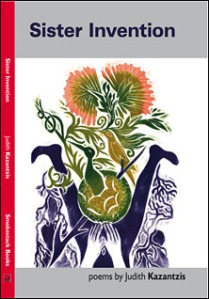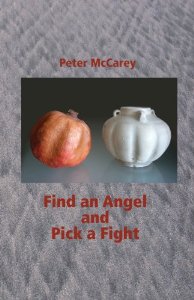Sister Invention, Judith Kazantzis, Smokestack, £8.95
reviewed by Emma Lee
Sister Invention is Judith Kazantzis’s first major collection for a decade and her subjects include death, both personal and via reported news, the reconfiguration of Greek myths from a feminist perspective, and the birth of a grandchild: all with a contemporary feel. Writing from the perspective of the overlooked wife of a historically famous figure is not a new idea and the success of such a poem relies on credibility: how likely is the voice in the poem that of the wife? Judith Kazantzis gives a voice to Mrs William Blake in ‘Mrs Blake’s Poe
Long long ago
the lion lay down with me
under the palm tree in the gardenHis sturdy, meaty lamb,
I pulled the beauty
like stringy old beans out of his sore throat
line by line
There now, like – a red flannel!He laughed at me
flung the flannel dramatically
into the lavender
I discreetly skipped out of the way
as it were, into the shady fold
of the page
Not only is the scenario and language realistic but the poet also resists giving Mrs Blake a modern sensibility. Gardens are useful metaphors and their landscapes can reflect the inner emotional landscape of the narrator. This is used to good effect in ‘Dick Cheyney’s Garden’, a sequence where the narrator discusses events, political and personal decisions away from the pressures of the White House and heated debates of The Senate. In Part III ‘Walking the long lawns’, Dick Cheyney muses on the emblematic attack on 9/11:
I switch on. Toy puffs blow Meccano planes
into Lego buildings, like the Spitfires
my little brothers used to circle
like wasps over the red carpet, bang, bang.
You couldn’t wring from the box more
than the voice knew, that sequence all day,
as modern transport scored its third,
and for all time, we were told, assured
legislated to believe: The world intuned,
the times awry
and nature out of it.
The poem captures the sense of disbelief of seeing a game most children play a variation of: crashing a toy plane into a toy building enacted on an adult, real scale. It’s accompanied by the modern need to know more: to have the answers after a few taps into a search engine and the frustration that the TV can only broadcast to, not interact with, its audience. The final line quoted doesn’t just underline the unnatural act but is also a reminder that Cheyney in is his garden, and the garden does more than act as a backdrop. The long sentences mirror the narrator’s thinking: small jumps from one point to the next. This politician doesn’t have grand ideas or big answers but reflects and reacts. Judith Kazantzis doesn’t just stop at 9/11 but continues into contemporary wars in Afghanistan and Syria. ‘The bombed woman’ could be any women caught up in war:
All the times the screaming head,
the bombed woman,
sees the planes about to
sees her town, her children, herself.
All those times
inside this skull
out through this mouth
sorrow’s grinding scream
protrudes its lava
The description is visual and also non-judgmental. Her focus is on the victims not the perpetrators. Judith Kazantzis records and assesses with compassion. She doesn’t write the victims’ response for them or resort to cliché. There’s no space for sentimentality here.
Sister Invention is large in scope but successfully woven together with no frayed edges. Judith Kazantzis’s tone varies from contemporary detail to lyricism. Her poems reward re-reading and it’s a book to dip into frequently.
Emma Lee
http://emmalee1.wordpress.com/



